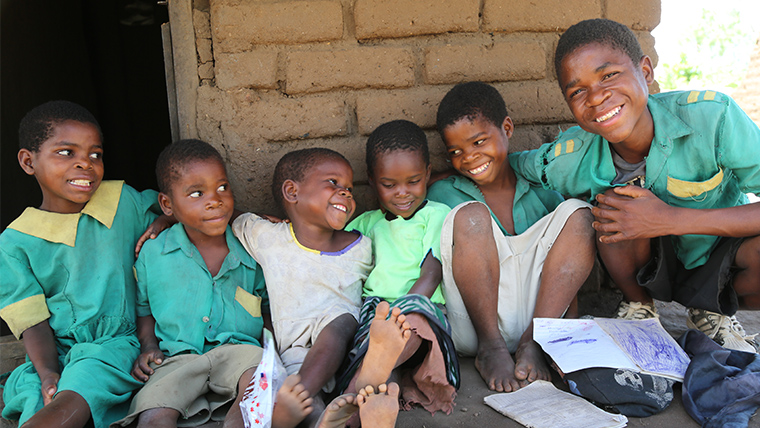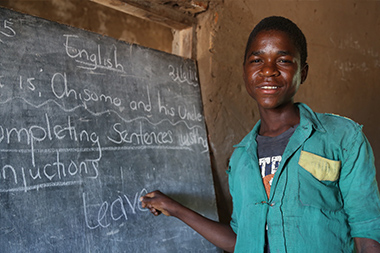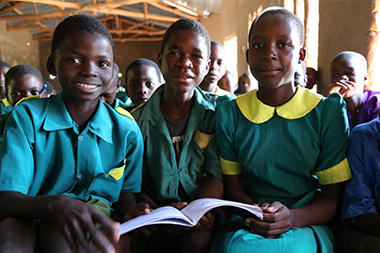Coming full circle | Hope in a time of hunger in Malawi

For the rest of my life, I will never forget the day I met Leonard, a 13-year-old boy who had his life and dreams turned upside down.
Leonard’s face is burnt in my memory and I think of him every time I think of children, hunger and need. His home village in the Zomba district of eastern Malawi was the capital city during the British colonial days, but today it looks increasingly empty.
This year, almost three million Malawians are going hungry. A flood, followed by a drought in the 2014-2015 farming season proved to be too much for poor farmers. They lost most of their crops.
I arrived at Leonard’s home with no notice looking for a story. It was exactly 12 midday and time for lunch. Four-year-old Janet and her siblings were eating mangos. None of the children looked healthy. Mangos had been their breakfast, lunch and supper for two weeks. They had no idea if or when help would come.
I learnt that Fanny, their mother, was working as a gardener and received mangos as payment. Helping herself to another mango, Janet looked up at me and gave me a big smile.
My heart broke. The sun was scorching hot. One of Janet’s brothers, ten-year-old Lojasi, lay on the veranda in pain. He had been sick for over a week and their mother did not know what to do.
“We are just waiting for God to touch him,” Leonard said solemnly.
In the absence of their father, Leonard had assumed a paternal role at an early age. He had quit school to help his mother find the next meal for him and his siblings. “I couldn’t concentrate in class knowing my mother was going through pain to find food,” Leonard told me bleakly.
The children’s father left home and abandoned them soon after Janet, the youngest, was born. To this day, they still don’t know where he is.
Although Leonard was visibly upset, he didn’t blame his father for the situation his family were in. I remember him telling me with a quiet smile, “God planned it all and he knows when to turn things better.”
At that moment, I wanted to cry out to God.
Despite seeing the faces of suffering time and time again, my heart finds every scenario new; every hungry child is a reminder of the work that remains to be done - a call to action in this broken world.
I had to give Leonard hope that everything would be alright, even though I didn’t know how or when it would be. I felt duty bound to assure Fanny that the world had enough to share with her and that her children would grow to realize their full potential.
But they were hungry; they needed more than just words.
I looked at Leonard’s mother. Just like my mother when I was small, all she wanted was the best for her children. But the circumstances were beyond her control.
There I was, with a child whose situation was quite miserable but he never blamed anyone; he never grumbled. At the same time that some of my friends were eating delicious meals in other corners of the world, here was Leonard praising the Creator for the mangos before him and his family.
The return of hope
Two months later, I returned to eastern Malawi to see my young friend Leonard. Walking by the school where he is enrolled, a boy came rushing towards me with joy all over his face - it was ten-year-old Lojasi. “Leonard is also in class!” he said to me excitedly as we walked together to the head teacher’s office.
 Leonard and his dreams were back on track towards a promising future. He told me that soon after my visit, World Vision had registered community members to take part in a food-for-work programme in his village. His mother, Fanny, was one of them. Through the programme, she is planting trees and maintaining forests in return for a 50 kilogram bag of maize, six kilograms of beans and two litres of vegetable oil every month.
Leonard and his dreams were back on track towards a promising future. He told me that soon after my visit, World Vision had registered community members to take part in a food-for-work programme in his village. His mother, Fanny, was one of them. Through the programme, she is planting trees and maintaining forests in return for a 50 kilogram bag of maize, six kilograms of beans and two litres of vegetable oil every month.
When we went home at the end of school that day, there was maize porridge waiting for them. “Your friends don’t eat mangos for lunch anymore,” joked Fanny. For the first time, I saw her smiling. She was a happy mother.
At the table, Janet grinned as she ate with her hands, mopping up the beans on her plate with maize. Outside their small grass thatched house grew maize that looked so green. If the rain keeps falling, the family might have some maize later in the year.
Leonard is still the father of the house. He still helps his mother in the garden and he tells his siblings that they too must work hard.
Parallel lives
My life and that of Leonard are similar in many ways.
The worst hunger I have known was in 2002 when Malawi had to import maize from Mozambique. While the government told us every day that people would not die, one or two lives were lost every day - lives of people I knew.
I recall that World Vision helped back then as we are helping now, by providing food and supplying the community with planting materials.
 Time moves quickly and it heals broken souls. 14 years later, I am a communicator for World Vision in Southern Malawi, a region that is usually oscillating between floods and droughts, rendering a lot of children and families poor in the process.
Time moves quickly and it heals broken souls. 14 years later, I am a communicator for World Vision in Southern Malawi, a region that is usually oscillating between floods and droughts, rendering a lot of children and families poor in the process.
Growing up, I experienced the reality of what hunger does to children and their families. Through the eyes and story of Leonard, I came face-to-face with the untold stories of children caught up in what is now Malawi’s worst food crisis since 2002.
Living in the village away from the city, life is hard for Leonard, just as it was for me. Although education seems the only vehicle to get him out of poverty, when it was necessary he dropped out of school to work and help feed his siblings - a huge sacrifice from a boy so young.
I remembered the hopeless days before my World Vision sponsor transformed my life by offering me an opportunity to attend high school when every reality around us said a loud ‘impossible’. It was this opportunity that brought me to where I am today.
Charles Kabena is a communicator with World Vision Malawi, where he helps tell the stories of our child sponsorship and emergency response work. Malawi, as well as much of Southern Africa is currently ravaged by droughts as a result of the El Nino phenomenon. In East and Southern Africa some 11 million children are at risk of hunger, disease and lack of water. Our recent research has shown that many children have not only dropped out of school to deal with the lack of food, but many are now also exceptionally vulnerable, living away from home in order to do so.